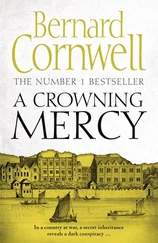'You hear that?' Sandman turned on Meg. 'He says I should tie your hands, and I will if you make more noise.'
She recognised defeat and began to swear viciously, which only made the rector believe Sandman's claim. He began using his napkin like a fly-swatter to drive his parishioners away from the cursing girl who, seeing that her bid for freedom had failed, and fearing that Sandman would pinion her if she did not cooperate, used a stone watering trough as a mounting block to get back onto her horse. She was still swearing as they left the village.
They trudged on. They were all tired, all irritable, and the heat and the long road sapped Sandman's strength. His clothes felt sticky and filthy, and he could feel a blister growing on his right heel. He was still limping because of the damage he had done to his ankle jumping onto the stage of the Covent Garden theatre, but like all infantryman he believed the best way to cure a sprain was to walk it out. Even so it had been a long time since he had walked this far. Sally encouraged him to ride, but he wanted to keep a spare horse fresh and so he shook his head and then fell into the mindless trudge of the soldier's march, scarce noticing the landscape as his thoughts skittered back to the long dusty roads of Spain and the scuff of his company's boots and the wheat growing on the verges where the seeds had fallen from the commissary carts. Even then he had rarely ridden his horse, preferring to keep the animal fresh.
'What happens when we get to London?' Berrigan broke the silence after they had passed through yet another village.
Sandman blinked as though he had just woken up. The sun was sinking, he saw, and the church bells were calling for evensong. 'Meg is going to tell the truth,' he answered after a while. She snorted in derision and Sandman held his temper in check. 'Meg,' he said gently, 'you want to go back to the Marquess's house, is that it? You want to go back to your chickens?'
'You know I do,' she said.
'Then you can,' he said, 'but first you're going to tell part of the truth.'
'Part of?' Sally asked, intrigued.
'Part of the truth,' Sandman insisted. He had, without realising it, been thinking about his dilemma and suddenly the answer seemed clear. He had not been hired to discover the Countess's murderer, but rather to determine whether or not Corday was guilty. So that was all he would tell the Home Secretary. 'It doesn't matter,' he told Meg, 'who killed the Countess. All that matters is that you know Corday did not. You took him out of her bedroom while she was still alive, and that's all I want you to tell the Home Secretary.'
She just stared at him.
That is the truth, isn't it?' Sandman asked. She still said nothing, and he sighed. 'Meg, you can go back to the Marquess's house. You can do whatever you want with the rest of your life, but first you have to tell that one small part of the truth. You know Corday is innocent, don't you?'
And, at last, at long last, she nodded. 'I saw him out the street door,' she said softly.
'And the Countess was still alive?'
'Of course she was,' Meg said. 'She told him to come back the next afternoon, but by then he was arrested.'
'And you'll tell that to the Home Secretary?'
She hesitated, then nodded. 'I'll tell him that,' she said, 'and that's all I'll tell him.'
'Thank you,' Sandman said.
A milestone told him that Charing Cross lay eighteen miles ahead. The city's smoke filled the sky like a brown fog while to his right, glimpsed through the folds of darkening hills, the shining Thames lay flat as a blade. Sandman's tiredness vanished. Part of the truth, he thought, would be enough and his job, thank God, would be done.
===OO=OOO=OO===
Jemmy Botting, hangman of England, came to Old Bailey in the early evening to inspect the finished scaffold. One or two passers by, recognising him, called out ironic greetings, but Botting ignored them.
He had little to inspect. He took it on trust that the beams were properly bolted together, the planks nailed down and the baize properly secured. The platform did sway a little, but it always had and the motion was no worse than being on the deck of a ship in a very slight swell. He pulled the peg that held the trapdoor's support beam in place, then went down below into the gloom beneath the platform where he seized the rope that tugged the beam free. It gave way with a judder, then the trapdoor swung down to let in a wash of evening sunlight.
Botting did not like that judder. No one had been standing on the trapdoor, yet still the beam had been reluctant to move, so he opened his bag and took out a small jar of tallow that had been a gift from the chandler. He climbed the wooden framework and greased the beam until its surface felt slippery, then he raised the trapdoor and clumsily pushed the beam back into place. Two rats watched him and he growled at them. He clambered down to the Old Bailey's cobbles and pulled the rope again and this time the beam slid easily and the trapdoor thumped down to bang against two of the upright supports. 'Bloody works, eh?' Botting said to the rats that were quite unafraid of his presence.
He replaced the trapdoor and beam, put the tallow back in his bag and climbed to the top of the scaffold where he first replaced the locking peg, then gingerly tested the firmness of the trapdoor by putting one foot on its planks and slowly easing his weight onto that leg. He knew it was secure, knew it would not give way beneath him, yet still he tested it. He did not want to become London's laughing stock by pushing a prisoner onto a trap that gave way before the rope was round the man's neck. He grinned at the thought, then, confident that all was ready, he went to the Debtor's Door and knocked loudly. He would be given dinner in the prison, then provided with a small bedroom above the Lodge. 'Got any rat poison?' he asked the turnkey who opened the door. 'Only there's rats the size of bleeding foxes under the scaffold. That platform can't have been up more than two hours yet there's already rats there.'
'Rats everywhere,' the turnkey said, then locked the door.
Beneath them, even though it was a warm evening, the cellars of Newgate Prison held a chill and so, before Charles Corday and the other condemned man were put into the death cell, a coal fire was lit in the small hearth. The chimney did not draw well at first and the cell filled with smoke, but then the flue heated and the air cleared, though the stench of coal smoke stayed. A metal chamber pot was put in a corner of the cell, though no screen was provided for privacy. Two iron cots with straw palliasses and thin blankets were put by the wall and a table and chairs were provided for the turnkeys who would watch the prisoners through the night. Lamps were hung from iron hooks. At dusk the two men who would die in the morning were brought to the cell and given a meal of pease pottage, pork chops and boiled cabbage. The Keeper came to see them during their supper and he thought, as he waited for them to finish their meal, that the two men were so utterly dissimilar. Charles Corday was slight, pale and nervous while Reginald Venables was a hulking brute with a lavish dark beard and a grimly hard face, yet it was Corday who had committed murder while Venables was being hanged for the theft of a watch.
Corday merely picked at his food then, his leg irons clanking, went to his cot where he lay down and gazed wide-eyed at the damp stones of the vaulted ceiling. 'Tomorrow…' the Keeper began as Venables finished his meal.
'I hope that damn preacher won't be there,' Venables interrupted.
'Silence while the Keeper's talking,' the senior turnkey growled.
'The preacher will be there,' the Keeper said, 'to offer what spiritual comfort he can.' He waited as the turnkey removed the spoons from the table. 'Tomorrow,' he started again, 'you will be taken from here to the Association Room where your irons will be struck and your arms pinioned. You will already have been given breakfast, but there will be brandy for you in the Association Room and I advise you to drink it. After that we walk to the street.' He paused. Venables watched him with a resentful eye while Corday seemed oblivious. 'It is customary,' the Keeper went on, 'to slip the hangman a coin because he can make your passage to the next world less painful. Such an emolument is not something of which I can approve, but he is an officer of the city, not of the jail, and so I can do nothing to end the practice. But even without such an emolument you will find that your punishment is not painful and is soon done.'
Читать дальше
Конец ознакомительного отрывка
Купить книгу












